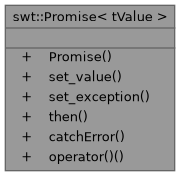Type-safe promise for asynchronous result handling with continuation chaining. More...
#include <Promise.h>

Public Member Functions | |
| Promise () | |
| Default constructor - creates promise with shared state. | |
| void | set_value (tValue value) |
| Resolve promise with a value. | |
| void | set_exception (std::exception_ptr exception) |
| Reject promise with an exception. | |
| template<typename F > | |
| auto | then (std::shared_ptr< SLLooper > &looper_, F func) -> Promise< std::invoke_result_t< F, tValue > > |
| Chain continuation callback for promise resolution. | |
| template<typename F > | |
| auto | catchError (std::shared_ptr< SLLooper > &looper_, F func) -> Promise< tValue > |
| Chain error handler for exception recovery. | |
| void | operator() (tValue value) |
| Function call operator for convenient promise resolution. | |
Detailed Description
class swt::Promise< tValue >
Type-safe promise for asynchronous result handling with continuation chaining.
- Template Parameters
-
tValue Type of value that the promise will resolve to
Promise provides a modern C++ implementation of the promise/future pattern with:
- Type-safe continuation chaining: Automatic type deduction for chained operations
- Exception propagation: Automatic error handling through the promise chain
- Asynchronous execution: Integration with SLLooper for thread-safe callback execution
- Move semantics: Efficient value transfer without unnecessary copies
- Template specialization: Special handling for void-returning promises
Key features:
- Continuation chaining: then() method for sequential async operations
- Error handling: catchError() method for exception recovery
- Thread safety: Callbacks execute in specified SLLooper thread context
- Type transformation: Support for changing value types through the chain
The Promise class works in conjunction with State objects to manage the asynchronous state and provide thread-safe communication between producers and consumers of asynchronous results.
- Note
- Thread-safe when used with SLLooper for callback execution
- Warning
- Promise can only be resolved once with either value or exception
- See also
- swt::State "State", SLLooper, Promise
Constructor & Destructor Documentation
◆ Promise()
| swt::Promise< tValue >::Promise | ( | ) |
Default constructor - creates promise with shared state.
Initializes a new promise with a shared State object for communication with continuation handlers and error handlers.
- Note
- Implementation in Promise.tpp
Member Function Documentation
◆ catchError()
| auto swt::Promise< tValue >::catchError | ( | std::shared_ptr< SLLooper > & | looper_, |
| F | func | ||
| ) | -> Promise< tValue > |
Chain error handler for exception recovery.
- Template Parameters
-
F Function type for error handler callback (auto-deduced)
- Parameters
-
looper_ SLLooper instance for callback execution thread context func Error handler function that receives std::exception_ptr
- Returns
- Promise<tValue> New promise continuing the chain
Registers an error handler that executes when the promise is rejected. The error handler can recover from errors by returning a value, or let errors propagate by throwing or returning nothing.
Error recovery patterns:
- Recovery: Return a valid tValue to continue with success
- Propagation: Throw or re-throw to propagate error down chain
- Logging: Log error and return default value for graceful degradation
- Note
- Implementation in Promise.tpp
- Thread-safe registration and execution
◆ operator()()
|
inline |
Function call operator for convenient promise resolution.
- Parameters
-
value Value to resolve the promise with
Convenience operator that allows using the promise as a callable object for resolution. Equivalent to calling set_value(value).
Definition at line 203 of file Promise.h.
References swt::Promise< tValue >::set_value().

◆ set_exception()
| void swt::Promise< tValue >::set_exception | ( | std::exception_ptr | exception | ) |
Reject promise with an exception.
- Parameters
-
exception Exception pointer to reject the promise with
Sets the promise to failed state and triggers any registered error handlers. This method can only be called once per promise.
- Note
- Implementation in Promise.tpp
- Thread-safe operation
◆ set_value()
| void swt::Promise< tValue >::set_value | ( | tValue | value | ) |
Resolve promise with a value.
- Parameters
-
value Value to resolve the promise with (moved)
Sets the promise value and triggers any registered continuation callbacks. This method can only be called once per promise instance. Subsequent calls are ignored.
- Note
- Implementation in Promise.tpp
- Thread-safe operation
Referenced by swt::Promise< void >::operator()(), and swt::Promise< tValue >::operator()().

◆ then()
| auto swt::Promise< tValue >::then | ( | std::shared_ptr< SLLooper > & | looper_, |
| F | func | ||
| ) | -> Promise< std::invoke_result_t< F, tValue > > |
Chain continuation callback for promise resolution.
- Template Parameters
-
F Function type for continuation callback (auto-deduced)
- Parameters
-
looper_ SLLooper instance for callback execution thread context func Continuation function to execute when promise resolves
- Returns
- Promise<ReturnType> New promise for further chaining
Registers a continuation callback that executes when the promise resolves successfully. The continuation function receives the resolved value and can return a new value of any type, enabling type transformation chains.
Key capabilities:
- Type transformation: Return type can differ from input type
- Exception safety: Automatic exception propagation through chain
- Asynchronous execution: Callbacks run in SLLooper thread context
- Chaining: Returns new promise for further then()/catchError() calls
- Note
- Implementation in Promise.tpp
- Thread-safe registration and execution
The documentation for this class was generated from the following files:
- include/CpuTaskExecutor.h
- include/Promise.h